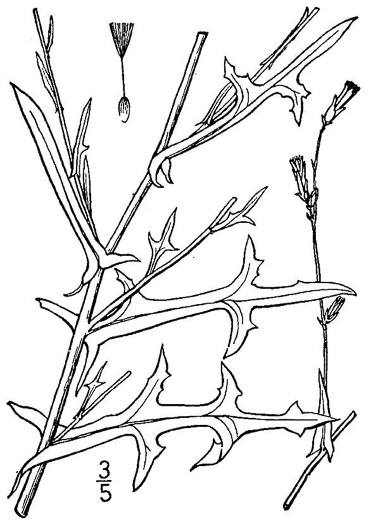Spermatophytes (seed plants): Angiosperms (flowering plants): Eudicots: Core Eudicots: Asterids: Campanulids: Asterales
WEAKLEY'S FLORA OF THE SOUTHEASTERN US (4/24/22):
Lactuca saligna
FAMILY
Asteraceae_
Go to FSUS key
Dig deeper at SERNEC, a consortium of southeastern herbaria.
Check out EDDMapS.org to see where this has been reported.
Read more about Willowleaf Lettuce at Vascular Plants of North Carolina.
SYNONYMOUS WITH
PLANTS NATIONAL DATABASE:
Lactuca saligna
FAMILY
Asteraceae_
SYNONYMOUS WITH Flora of North America north of Mexico, vol. 19-20-21 (2006)
Lactuca saligna
SYNONYMOUS WITH VASCULAR FLORA OF THE CAROLINAS (Radford, Ahles, & Bell, 1968) 179-07-002:
Lactuca saligna FAMILY Asteraceae_
COMMON NAME:
Willowleaf Lettuce
To see larger pictures, click or hover over the thumbnails.
WEAKLEY'S FLORA OF THE SOUTHEASTERN US (4/24/22):
Lactuca saligna
FAMILY
Asteraceae_
SYNONYMOUS WITH
PLANTS NATIONAL DATABASE:
Lactuca saligna
FAMILY
Asteraceae_
SYNONYMOUS WITH
Flora of North America north of Mexico, vol. 19-20-21
Lactuca saligna
SYNONYMOUS WITH
VASCULAR FLORA OF THE CAROLINAS (Radford, Ahles, & Bell, 1968) 179-07-002:
Lactuca saligna
FAMILY
Asteraceae_
If a search such as "Carex leptalea var. leptalea" doesn't deliver the results you want, try "Carex leptalea".
Or, to minimize chances of a misspelling, try just "Carex le".
Less is more: If "pencil flower" doesn't deliver the results you want, try "pencil".


